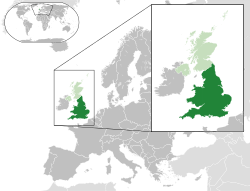Comisiwn y Gyfraith | |
 Law Commission logo | |
 England and Wales within the UK and Europe | |
 | |
| Established | 1965 |
|---|---|
| Type | Advisory non-departmental public body sponsored by the Ministry of Justice |
| Legal status | Created by the Law Commissions Act 1965 |
| Purpose | To keep the law of England and Wales under review and to recommend reform where needed |
| Headquarters | 52 Queen Anne's Gate, London SW1H 9AG |
| Coordinates | 51°30′01″N0°08′03″W / 51.5003°N 0.1341°W |
Region served |
|
Official languages |
|
Chair | Sir Peter Fraser |
Chief Executives | Joanna Otterburn and Stephanie Hack |
| Website | www |
In England and Wales the Law Commission (Welsh : Comisiwn y Gyfraith) is an independent law commission set up by Parliament by the Law Commissions Act 1965 [1] to keep the law of England and Wales under review and to recommend reforms. The organisation is headed by a Chair (a judge of the High Court or Court of Appeal, currently Sir Peter Fraser LJ) and four Law Commissioners. It proposes changes to the law that will make the law simpler, more accessible, fairer, modern and more cost-effective. It consults widely on its proposals and in the light of the responses to public consultation, it presents recommendations to the UK Parliament that, if legislated upon, would implement its law reform recommendations. The commission is part of the Commonwealth Association of Law Reform Agencies.
